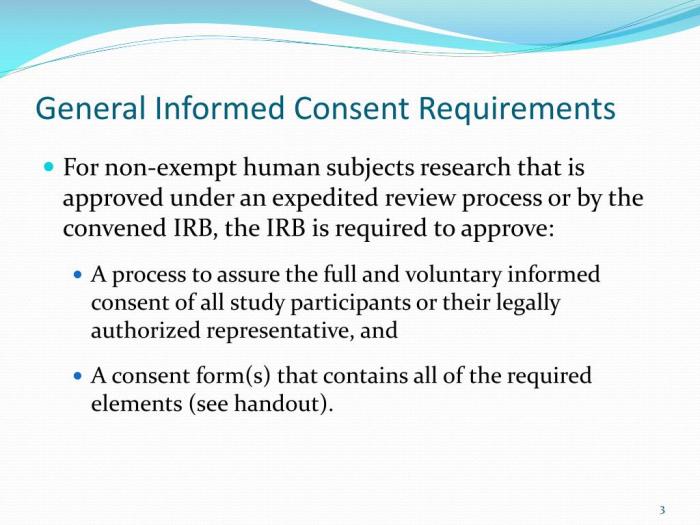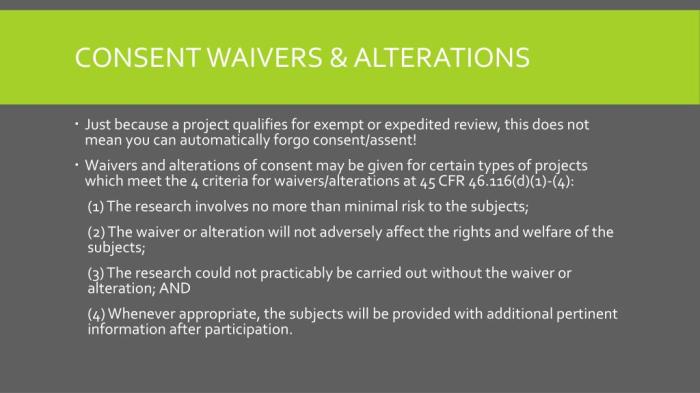For general waivers or alterations of consent the final rule – The “Final Rule for General Waivers or Alterations of Consent” presents significant implications for research ethics and regulatory compliance. This rule establishes clear guidelines for obtaining waivers or alterations of consent in research involving human subjects, ensuring the protection of participant rights while facilitating the conduct of essential research.
The rule Artikels the purpose and scope of general waivers or alterations of consent, highlighting the key provisions and requirements for obtaining such waivers or alterations. It also emphasizes the ethical considerations, regulatory framework, and best practices involved in this process, providing researchers with a comprehensive understanding of their responsibilities and obligations.
General Waivers or Alterations of Consent: Final Rule

The final rule on general waivers or alterations of consent provides guidance on when and how researchers may obtain a waiver or alteration of consent for research involving human subjects. The rule aims to protect the rights and welfare of human subjects while allowing researchers to conduct important research.
The final rule includes the following key provisions:
- A waiver or alteration of consent may be granted if the research involves no more than minimal risk to the subjects and the research could not practicably be conducted without the waiver or alteration.
- The researcher must provide participants with a brief statement that describes the research and any risks or discomforts that may be involved.
- The researcher must obtain written documentation of the participant’s consent, unless the IRB waives this requirement.
Examples of situations where a waiver or alteration of consent may be appropriate include:
- Research involving the use of existing data or specimens that have been collected without consent.
- Research involving the observation of public behavior.
- Research involving the use of educational tests or surveys that are not designed to influence the subjects’ behavior.
Ethical Considerations

When considering a waiver or alteration of consent, researchers must take into account the following ethical considerations:
- The potential risks and benefits of the research.
- The voluntariness of the subjects’ participation.
- The subjects’ understanding of the research and their rights.
Researchers should also consider the following guidance when balancing the ethical considerations with the need for research:
- The research should be scientifically valid and have the potential to make a significant contribution to knowledge.
- The research should be designed to minimize the risks to the subjects.
- The subjects should be provided with as much information as possible about the research and their rights.
Regulatory Framework

The regulatory framework governing general waivers or alterations of consent is complex and varies from country to country. In the United States, the final rule on general waivers or alterations of consent is implemented by the Department of Health and Human Services (HHS) and the Food and Drug Administration (FDA).
The HHS regulations apply to all research involving human subjects that is conducted or supported by HHS. The FDA regulations apply to all clinical trials involving human subjects that are conducted or supported by the FDA.
The IRB is responsible for reviewing and approving requests for waivers or alterations of consent. The IRB must consider the ethical considerations discussed above, as well as the regulatory requirements, when making its decision.
The process for obtaining IRB approval for a waiver or alteration of consent varies from institution to institution. Researchers should contact their IRB for more information.
Best Practices

Researchers can follow these best practices to obtain and document general waivers or alterations of consent:
- Use clear and concise language in the brief statement that describes the research and any risks or discomforts that may be involved.
- Obtain written documentation of the participant’s consent, unless the IRB waives this requirement.
- Keep a record of all communications with the IRB regarding the waiver or alteration of consent.
Researchers should also ensure that participants understand the risks and benefits of the research and that they are voluntarily participating.
Helpful Answers: For General Waivers Or Alterations Of Consent The Final Rule
What is the purpose of the Final Rule for General Waivers or Alterations of Consent?
The purpose of the Final Rule is to establish clear guidelines for obtaining waivers or alterations of consent in research involving human subjects, ensuring the protection of participant rights while facilitating the conduct of essential research.
What are the key provisions of the Final Rule?
The key provisions of the Final Rule include the requirements for obtaining a waiver or alteration of consent, the ethical considerations that should be taken into account, the regulatory framework governing general waivers or alterations of consent, and the best practices for obtaining and documenting such waivers or alterations.
When may a waiver or alteration of consent be appropriate?
A waiver or alteration of consent may be appropriate when the research involves minimal risk to participants, when obtaining consent is not feasible or would compromise the validity of the research, or when the research involves the use of previously collected data or specimens.